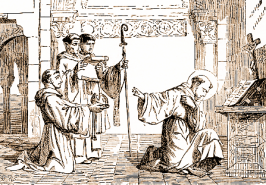Lives of the Saints
Our Models and Protectors
Spiritual Bouquet:
January 12

Saint Aelred or Alfred
Abbot
(1109-1167)
Saint Aelred was remarked in the court of a royal Saint, David of Scotland, for his humility and his gentleness. He resolved to separate from his king, his friends, and all whom he loved dearly, reflecting that death will soon separate us from all things in this world. To make his sacrifice complete, he left Scotland and went to the Province of York in England, where he received the habit at the age of twenty-four years under William, Abbot of Rieval, a disciple of Saint Bernard.
The heart of Saint Aelred never ceased to love his friends, according to his own avowal, because the center of it was Love itself. He was heard to exclaim: What is love, O my God? It is, if I am not mistaken, this ineffable delight of the soul, the more sweet as it is more pure, the more gratifying as it is more ardent. The one who loves You possesses You in proportion to his love, because You are Love. Love is the torrent of joy with which you inebriate Your elect, transforming them into Yourself by love for You!
As a young monk, his attention was drawn to one of his brethren because of his holiness. This good monk, named Simon, had left the world in his youth, and he appeared as though deaf and dumb, so absorbed was he in God. One day Aelred, forgetting for a moment the rule of perpetual silence, spoke to him. At once he prostrated himself at his feet, acknowledging his fault; but Simon's look of pain haunted him for many a year, and taught him to let no human sentiment disturb for one moment his or another's union with God.
Aelred in 1142 was named Abbot of Revesby, a newly founded Cistercian monastery, and the following year was obliged to take upon himself the government of the larger monastery of Rieval. A novice once came to him, saying that he must return to the world. But Aelred had begged his soul of God and answered, Brother, do not ruin yourself; nevertheless you will be unable to do so, despite your desire. The novice would not listen, however, and wandered among the hills, thinking all the while he was going far from the abbey. At sunset he found himself before a convent strangely like Rieval, and Rieval it was. The first monk he met was Aelred, who embraced him, saying, Son, why have you done this? I have wept for you with many tears, and I trust in God that, as I have asked of Him, you will not perish. The world does not so dearly love its friends.
At the command of his superiors Aelred composed his great works, both historical and ascetic, among which are the Life of David, King of Scotland; Life of Saint Margaret, Queen of Scotland; Spiritual Friendship and Mirror of Charity. In the last-named treatise he says that true love of God is only to be obtained by joining ourselves in all things to the Passion of Christ. Saint Aelred died in 1167, Superior of some three hundred monks.
Reflection. When a soul has given itself to God, God gives back friendship, with all His other gifts, a hundredfold multiplied. Friends are then loved no longer for themselves only, but for God, and with a love lively and tender, for God can easily purify sentiment. It is not sentiment but self-love which corrupts friendship.
Little Pictorial Lives of the Saints, a compilation based on Butler's Lives of the Saints and other sources by John Gilmary Shea (Benziger Brothers: New York, 1894); Les Petits Bollandistes: Vies des Saints, by Msgr. Paul Guérin (Bloud et Barral: Paris, 1882), Vol. 1.